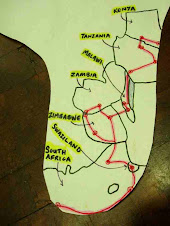WSF as open space or political actor?
 I attended a workshop hosted by “Sociologists Without Borders” – a very academic group of people philosophizing about the WSF. Almost all of the 15-20 people in the room were associated with a school of some sort, as professors, doctorate students, economists or undergrads. One guy introduced himself as a “militant sociologist.”
I attended a workshop hosted by “Sociologists Without Borders” – a very academic group of people philosophizing about the WSF. Almost all of the 15-20 people in the room were associated with a school of some sort, as professors, doctorate students, economists or undergrads. One guy introduced himself as a “militant sociologist.”
As they introduced themselves, a few said it was so good to be here at the WSF because “it makes it real”—usually they are removed. It was a little amusing for me, as they discussed “grassroots organizations” as distant entities and the WSF as a “pedagogical instrument.” So I introduced myself by saying that I left academia to be a community organizer. I felt like I represented the grassroots. Yeah.
Anyway, the discussion was quite interesting (it tickled my intellectual side). The basic question at hand was about the organization of the WSF. As it is now, anyone can offer workshops and the week is filled with random actions and events. This year, they added “day four,” a process in which each thematic group meets together in the morning of the fourth day to summarize their findings and positions and then report to a general assembly in the afternoon where together we would make a collective statement. (I’ll reflect on Day Four in the Day Four section.)
The issue in this workshop was asking if the WSF should get more focused and directed so as to make a collective political statement and action(s), instead of the somewhat chaotic nature of it. Of course, you can imagine the many people at the Forum who would resist all forms of someone trying to impose too much structure or control on them… it could easily be taken as one particular group or person having more power than others. On the other hand, I think people crave a sense of bringing it all together. After all, it’s such a unique place to spark some serious international action!!
When Emanuel Wallerstein, one of the speakers, was asked if the WSF is repetitive each year he said that “the tone and the focus of the debates have evolved.”
François Houtart (pictured here above) explained that a last year, a group formed to create the Bamako Appeal, a process the day before the WSF that was meant to create a document of collective consciousness. He said that “the problem is that it’s not enough to have cultural transformation, we also need a sense of urgency for action. We are dancing on the Titanic right now.” He described Via Campesina (international landless people’s movement) as the best example of a powerful movement of collective actors on an international level. Worldwide collective action!
The idea of the Bamako Appeal was to tackle the fundamental issues of the Forum. They invited 80 people to form into 10 teams to focus on 10 topics. 400 people ended up getting involved, and between the number of people, the technicalities of doing the project in four languages, and the various expressions of the 10 groups, Francois said that “it was difficult to go further than analysis, there was little in the document about alternatives and strategies.” He said that they basically “imposed intellectual methods on the grassroots” and therefore many people didn’t understand the way the project was organized. “For intellectuals it’s hard to know the sensibility of the grassroots.”


No comments:
Post a Comment